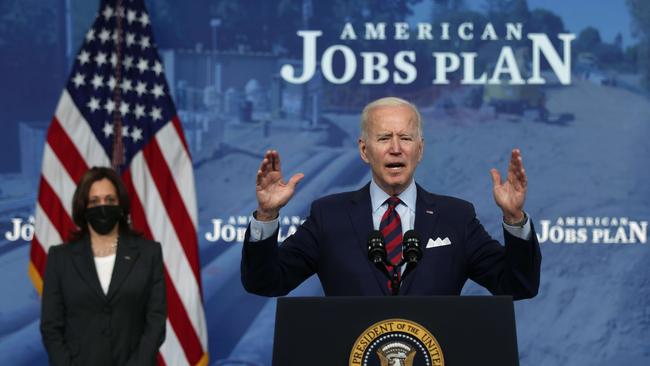Biden promises to rebuild ‘backbone of America’
The president concedes he is open to negotiating the biggest US spending proposal since World War II with Republicans.

Promising to “rebuild the backbone of America” President Joe Biden has conceded he is open to negotiating the biggest US spending proposal since World War II with Republicans, who argue the spending is excessive and poorly targeted on green schemes.
Declaring an “inflection point in history”, Mr Biden urged congress to back the $2.65 trillion in extra spending over a decade and an extra $2 trillion in proposed tax increases, mainly on larges businesses, partly reversing one of former president Donald Trump’s key reforms, over 15 years.
“Here’s what we won’t be open to: We will not be open to doing nothing. Inaction is simply not an option,” said a defiant president, who had flagged a big-spending plan improve the US’s crumbling infrastructure before the election last year.
“These aren’t Republican bridges or Democrat power grids, think of the space race or interstate highway system. We’re one nation united and connected.”
Since details of the spending were revealed last week Republicans have balked at the share slated for non-traditional infrastructure.
Republican senator Roy Blunt has said it was “stretching it to get to even 30 per cent of the bill that is actual infrastructure”. Senate Republican leader Mitch McConnell has called the bill at Trojan horse for pet Democratic Party social programs.
Roads, rail, ports, waterways, and airports would receive $237bn of the total, or less than 10 per cent. Electrical vehicles, clean energy tax credits, high speed internet and extra support for the disabled, meanwhile, and will attract almost $1.1 trillion.
“Imagine a world where you could travel coast to case without a single tank of gas or a high-speed train,” the president said at a press conference at the White House on Wednesday (Thursday AEST).
The administration has pointed to a Moody’s report released this week that suggested the proposal would generate an extra 2.7 million jobs over the decade,
If successful, the bill would be the second significant piece of legislation passed by the Biden administration since Mr Trump left the White House in January, following a US$1.9 trillion stimulus bill that was passed without Republican support.
Also on Wednesday, the US Treasury released details on how the administration hoped to pay for the extra trillions, including lifting the US corporate tax rate back to 28 per cent, a part reversal of the Trump administration’s decision to slash the tax from 35 per cent to 21 per cent.
The president said he was open to a lower corporate tax rate, if Republicans, whom he said he plans to invite to the White House shortly, could find other ways to raise revenue.
“Maybe it’s because I come from a middle-class neighbourhood, but I’m sick and tired of ordinary people being fleeced,” he said, ruling out ever increasing income taxes on any earning below US$400,000 a year.
The administration has also proposed a 15 per cent global minimum tax for US multinationals with income above $2bn a year (about 180 firms) which aimed to reduce the incentive for businesses to move their operations abroad.
“America will compete on our ability to produce talented workers, cutting-edge research and state-of-the-art infrastructure, not on whether we have lower tax rates than Bermuda or Switzerland,” said Treasury Secretary Janet Yellen, who last week advocated a global minimum tax across G20 nations.
Economists fear the extra spending, even with tax increases, will see the economy overheat. The US unemployment rate, as in Australia, fell to 6 per cent in March, down from a peak of 14.8 per cent in April last year.
Economic historian Niall Ferguson, reflecting the concerns of economists, has suggested the stimulus is too large overall, being around three times as big as the output shortfall the US is considered to be experiencing, in contrast to the Obama stimulus following the financial crisis, which was half as large.
“This is macro stimulus on the scale of World War II that could set off inflationary pressures of the kind we haven’t seen for a generation,” he said.
“Clearly the risk is of the economy over-heating and seeing inflation expectations do what they did under LBJ, where he ended up with inflation going from around 3 per cent to 6 per cent by end of presidency. That’s the risk Biden is running.”




To join the conversation, please log in. Don't have an account? Register
Join the conversation, you are commenting as Logout